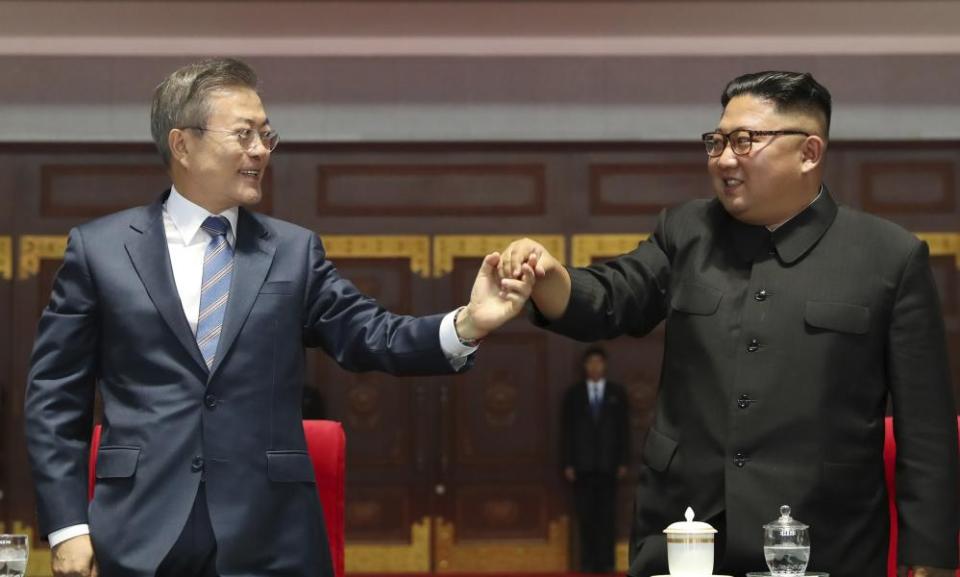Moon Jae-in is gambling with North Korea – and it could upset the US
Many South Koreans want an improved North-South relationship. But if Moon improves that relationship without denuclearization progress, it could cause a rift with Washington

Imagine you are the president of South Korea. Your country relies on its alliance with the United States as a deterrent against a nuclear-armed North Korea. Donald Trump criticizes your country over trade, spent the better part of a year threatening military strikes against North Korea, and reportedly even drafted a tweet ordering the withdrawal of the family members of US military stationed in South Korea, which would have been interpreted as a prelude to war.
What would you do? You’d rush to ease tensions with North Korea as fast as you could, while trying to mediate between the US and North Korea. And that’s exactly what the world witnessed this week in the third summit this year between the South Korean president, Moon Jae-in, and North Korean leader, Kim Jong-un. Mission accomplished – for the moment.
In Pyongyang this week Moon and Kim announced a variety of inter-Korean agreements ranging from easing military tensions to more family reunions, and Kim agreed to become the first North Korean leader to visit South Korea. Taken together, these steps could reduce the chances for a conflict and will keep the diplomacy moving.
Any progress in addressing North Korea’s nuclear program, however, was much less certain: “The North expressed its willingness to continue to take additional measures, such as the permanent dismantlement of the nuclear facilities at Yongbyon, as the United States takes corresponding measures in accordance with the spirit of the 12 June US-DPRK Joint Statement.” Exactly what “corresponding measures” the US would have to take, of course, is unclear.
While the US is concerned about North Korea’s nuclear program, South Korea has to live next door, and many there want an improved North-South relationship regardless of progress on the nuclear issue. And so, Moon is gambling. If he improves the relationship with Pyongyang without tangible progress on the nuclear issue, that could cause a serious rift with Washington. China would support the South’s engagement with the North, further driving a wedge between Washington and Seoul. Japan’s anxiety over the threat from North Korea would increase, and its opposition to diplomacy could push Seoul and Tokyo – two American allies – further apart.
A strong alliance with the US and progress on denuclearization are necessary to maintain popular support for diplomacy in South Korea
Moon recognizes that detente with North Korea will only go so far without progress on denuclearization, as past rounds of North-South diplomacy have shown. A strong alliance with the US and progress on denuclearization are necessary to maintain popular support for diplomacy in South Korea and the leverage necessary to extract concessions from Kim.
While far from perfect, the US should back Moon’s diplomatic efforts. Standing shoulder to shoulder with Moon will reduce the opportunities for North Korea and China to drive a bigger wedge in the US-South Korea alliance and keep the chances for a diplomatic breakthrough alive. And no approach to North Korea – whether tradeoffs in diplomacy or maintaining deterrence – will be successful without a united Seoul and Washington.
The US should ride the wave of North-South diplomacy by supporting a non-binding declaration to end the Korean war – which both Koreas are pushing, and which Trump reportedly promised Kim in Singapore – in exchange for the verifiable closing of nuclear facilities that Kim put on the table with Moon. This would be a significant step forward on which both sides could build.
While Kim’s intentions remain unclear, a key question is whether or not the US is capable of advancing diplomacy. While Trump has thrown the US head-first into diplomacy with North Korea – and may be the only top US official who supports the process – he is also uniquely incapable of taking advantage of complicated diplomatic negotiations, and seems only interested in the appearance of success.
Trump continues to fall for Kim’s fawning praise by regularly responding to one of the world’s most repressive dictators with comments like: “Thank you to Chairman Kim. We will both prove everyone wrong! There is nothing like good dialogue from two people that like each other!” Trump playing the role of North Korea desk officer undercuts his own diplomats: his impulsive comments make North Korea believe that Trump has already agreed to moves that are still being negotiated while sending the signal that only Trump’s words matter. The result? North Korea publicly singles out US officials as obstacles to Trump’s own wishes.
Trump is also unable to pursue a consistent strategy. After a year of threatening war, he announced a summit with Kim, then canceled the summit in a pique of anger at North Korean rhetoric only to reinstitute it days later after Moon patched things up. Trump then again abruptly canceled the secretary of state Mike Pompeo’s trip to Pyongyang mere hours after it was announced in September. Further complicating things are Trump’s hardline advisers including the vice-president, Mike Pence, and the national security adviser, John Bolton, who continue to look for ways to scuttle talks.
In diplomacy with North Korea there are always plenty of risks. The South Korean government may very well be unrealistic about what diplomacy can achieve (the agreement to seek a joint bid for the 2032 Summer Olympics seems Pollyannaish at best). North Korea’s asking price for progress may be too high. And the US administration may not be equipped to succeed in this round of diplomacy. But these diplomatic opportunities are rare, and without a strong US-South Korea alliance there will be no way to address the threats that North Korea poses.
The United States must give peace a chance, and that means giving Moon a chance.

